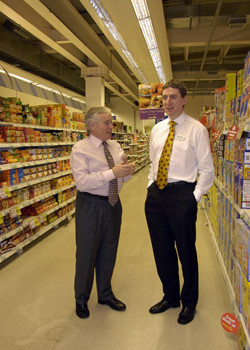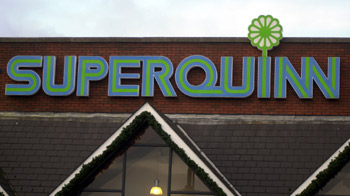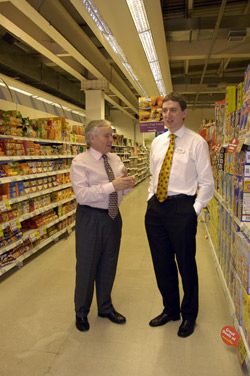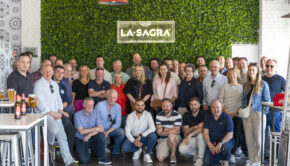A Superquinn dilemma

Superquinn needs a change of direction to survive these testing times, writes Dan White
12 August 2010
 When Feargal Quinn sold the Superquinn supermarket chain to a group of builders and property developers for €450m in 2005 there were many who wondered if Quinn had sold too cheaply. Not now. The property bust has decimated the value of its stores and the recession has reduced retail sales by almost a fifth from their peak levels, making the timing of Quinn’s sale now look utterly brilliant.
When Feargal Quinn sold the Superquinn supermarket chain to a group of builders and property developers for €450m in 2005 there were many who wondered if Quinn had sold too cheaply. Not now. The property bust has decimated the value of its stores and the recession has reduced retail sales by almost a fifth from their peak levels, making the timing of Quinn’s sale now look utterly brilliant.
Selling out?
Quinn’s decision to sell the family company over five years ago was the occasion of much soul-searching at the time. Here was a family-owned Irish business that had competed successfully with the big retail multinationals. Its sale to Select Retail Holdings, a consortium owned by Bernard McNamara (who sold his 14.5% stake to his fellow-shareholders in early 2008), Jerry O’Reilly, David Courtney, Bernard Doyle, Simon Cantrell, Terry Sweeny and Kieran Ryan, was widely reckoned to be the end of an era.
In truth, by the time Feargal Quinn agreed to sell Superquinn in January 2005, the chain was well past its best. Most of its stores were old and poorly located. The re-entry of Tesco into the Irish market in 1997, followed by the arrival of German discounters Aldi and Lidl three years later, hit Superquinn particularly hard.
With Tesco nibbling away at its traditional up-market clientele, and the discounters introducing a new price-consciousness into the Irish market, Superquinn was at sixes and sevens. By the middle of the last decade it had lost direction, unable to compete effectively with the many challenges it faced.

Present executive chairman Simon Burke (right) with founder Feargal Quinn

Present executive chairman Simon Burke (right) with founder Feargal Quinn
Neither one thing nor the other
The Superquinn of the 1980s and early 1990s, which had successfully carved out an upmarket niche with extremely high levels of customer service, had gradually given way to a retailing mish-mash, neither one thing nor the other. Unable to compete with discounters on price at the same time as it was losing its position at the top of the market to Tesco and SuperValu outlets.
However, what finally seems to have brought matters to a head for the Quinn family, was the botched attempt to introduce centralised distribution. Despite spending at least €38m the project was poorly-executed and left Superquinn trailing even further behind its larger rivals.
Property assets
While Superquinn might have been struggling in retailing terms it still had enormous property assets. As Irish property values soared to previously unimagined levels in the early noughties, Superquinn’s stores, and their surrounding surface car parks began to attract covetous glances from builders and property developers.
When Select Retail Holdings paid €450m for Superquinn in January 2005 it was widely expected that the consortium would move quickly to realise the underlying value of the retailer’s property assets. Superquinn, we were told had 530,000 square feet of retail floor space and 3,600 parking spaces, most of which were of the surface variety.
Then in May 2007 Superquinn announced that it had agreed to sell and lease back six of its stores to Friends First for €142.5m.
Unfortunately that was about as good as it got for Superquinn’s new owners. While the property assets may have had enormous unrealised development potential, in the meantime they had to get out and run the shops successfully.
Market share dipping
Easier said than done. Even before the recession hit, Superquinn was haemorrhaging market share. From about 8.4% at the time of the takeover it had dipped to about 7.8% a year later. And it has kept falling since. It is now down to an estimated 6.7%.
Compounding the slide in Superquinn’s market share has been the collapse in retail spending. Although the latest figures from the CSO show a slight increase in retail sales since the beginning of the year, the index is still down by more than a quarter in value terms since its late-2007 peak.
It is this combination of falling overall sales and declining market share that has proved so damaging to Superquinn. The new owners’ ambitious plans to open new Superquinn stores were abandoned with the exception of its Ranelagh, Rathbourne andTyrellstown outlets. Its largely complete Rathgar store is still standing empty after more than two years.
Property write downs
Instead Superquinn has closed a shop and laid off staff. Last year the group shut its Dundalk outlet and made 400 staff redundant. And the flow of bad news shows no signs of stopping. The most recent set of accounts lodged by Superquinn at the Companies Registration Office show that the retailer has written down the value of its properties by almost €180m.
The revelation that Superquinn has drastically written down the value of its remaining properties comes against the backdrop of frequent rumours that the chain has been offered for sale to other retailers. In September 2008 executive chairman Simon Burke was forced to publicly deny rumours that Superquinn was for sale. Then in April of this year Burke stated that no-one had come looking to buy Superquinn “in a long, long time”.
With the bank loans of some of Superquinn’s shareholders NAMA-bound, even Burke’s categoric denials of a possible sale have been insufficient to quell rumours about the retailer’s future.
Anglo takes Arnotts
Matters weren’t helped by last month’s revelation that
While Arnotts’ financial difficulties stem from its involvement in the ill-fated €750m “Northern Quarter” project to redevelop a 5.5 acre site next to its Henry Street store (rather than to any underlying problems at its core retail operations), the sight of the banks taking a tougher stance will not improve market sentiment towards other hard-pressed retailers.
So what can Burke do to restore Superquinn’s battered fortunes? He faces an unenviable task. In practice the company’s current shareholding structure probably rules out significant investment in new or refurbished stores. Burke will have to do the best with what he currently has.
Superquinn needs to get back to its roots
Until the resources become available for store upgrades Burke’s best option is to try and redefine the Superquinn retail offering. Having tried and failed at being all things to all shoppers, Superquinn needs to return to its up-market, high-quality, service-intensive roots.
As the experience of the 1980s and early 1990s shows, when Superquinn thrived despite the Irish economy being mired in deep depression, there is a significant group of shoppers who are prepared to pay over the odds in return for good service
and high quality.
Burke needs to get those customers coming back into his shops if Superquinn is to successfully ride out the current economic downturn.
The other perspective
Joe Comerford, retail consultant, says that Superquinn’s value structure is the best option for the group in the present market
I believe the idea that Superquinn should move upmarket to gain or regain market share is flawed. This might work in a couple of urban locations like Swords and possibly Blackrock and that’s a big might, but in outlets like Waterford, Carlow and Portlaoise that are already struggling, it would be the kiss of death. All customers are chasing price – they might like the idea of having bag packers in Superquinn but they don’t really want to pay for them or certainly not over the odds.
Although Superquinn’s Dundalk store was closed with the loss of 400 jobs, it is imperative to look at the bigger picture. All stores along the border were struggling during this time and all retailers either let staff go or adjusted their working hours. Superquinn closed an old non-performing outlet, which was essentially a good business decision rather than any sign that the company was in turmoil. Everyone who operates along the border let staff go including SuperValu, Centra and Tesco. They are all starting to reemploy now as euro/sterling differential improves, not to mention the impending VAT difference when the UK Vat increases to 20%.
Better price offerings
It is agreed that the central distribution model never worked in Superquinn’s favour and that a lot of money was spent on this project. However the introduction of Maurice Pratt’s brother, Carl Pratt, ex-Tesco into the Superquinn buying team, has been a very successful move. Good things are being said about his performance and this is being reflected in its better price offerings, which also might be the reason for the slight increase in market share. They have adopted an aggressive price policy on fresh foods.
An important point is that while everyone else is reducing their head office buying teams, Superquinn has invested heavily in its head office. Superquinn’s buying team is similar in size to the buying team in Musgrave. In comparison, Tesco has lost about 250 staff from its head office in the past two years. This has greatly helped reduce Tesco’s cost base. The majority of Tesco’s invoicing services are done in India now. Its property department has moved to the UK and the wages has moved out of Ireland to the UK or India. Most of the buying is now done in the UK and a lot of the distribution comes directly from the UK. There is a possibility that it will close its expensive head office in Dun Laoghaire when its lease expires shortly.
If you look at the discounters like Lidl, they also have a very small head office team because most of the buying is done on the continent. Aldi has a slightly bigger buying team – they buy a lot of its fruit and vegetables and fresh foods in Ireland.
Everyone is chasing value
It’s a very tough market at the moment and consumers are very price conscious and special-offer conscious. Superquinn’s expenses, pro rata to store size, would be higher than anyone else at this moment in time but aside from this it is facing similar challenges to all players in the market and its customers are chasing value like everyone else.



 Print
Print





Fans 0
Followers